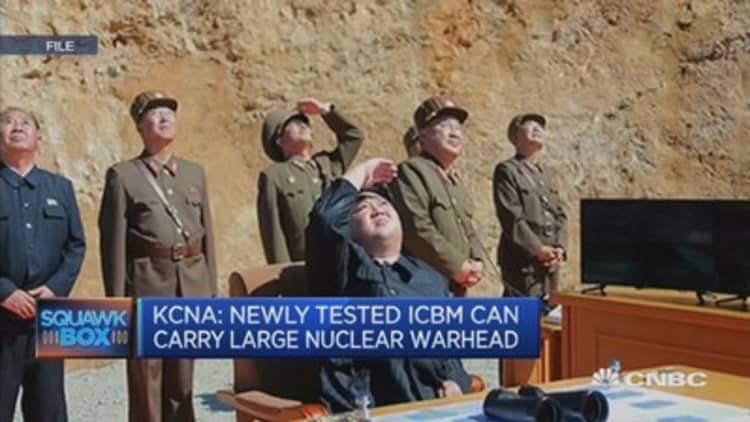
North Korea's latest missile launch indicates the reclusive regime is trying to drive a wedge between the United States and South Korea, a former U.S. ambassador to that country said Wednesday.
Christopher Hill, who was ambassador to the Republic of Korea from 2004 to 2005, told CNBC's "Squawk Box" that the North Korean regime believes that if it can get the U.S. out of the region, it can reunify the Korean peninsula.
"I don't think this is about negotiations. I don't think this is about a belligerent little country that is afraid we're all going to attack it," said Hill. "I think this is nothing short of an effort to create the circumstances, where it can de-couple the United States from the Korean peninsula."'
Hill previously led the U.S. delegation to the Six-Party Talks in 2005 between North Korea, South Korea, U.S., China, Japan and Russia, and centered around North Korea's nuclear ambitions. Those talks were designed to rein in Pyongyang's nuclear program, but like virtually efforts initiated by the United States over recent decades, they failed.
I think what they think is that by getting the U.S. out, they have a chance of unifying the Korean peninsula on their terms.Christopher Hillformer U.S. ambassador to South Korea
He explained: "I think what they're really striving for is circumstances where the U.S. president has to look at the possibility of massive U.S. civilian casualties, courtesy of an ICBM hitting US mainland — and looking at that, might think twice about coming to the assistance of the South Korean military."
On Tuesday, North Korea, through its state news agency KCNA, said it had succeeded in launching an intercontinental ballistic missile (ICBM) — something leader Kim Jong Un reportedly claimed to be close to accomplishing. ICBMs have a minimum range of around 3,400 miles (5,500 kilometers) and are capable of carrying nuclear weapons.
The U.S. subsequently confirmed that the missile was indeed an ICBM, and Secretary of State Rex Tillerson called it a "new escalation of the threat" to the U.S. In response to the provocation, U.S. and South Korean soldiers fired "deep strike" precision missiles into South Korean territorial waters on Tuesday, the Associated Press reported, citing U.S. military officials in Seoul.
Hill added that he thought the South Korean military is strong enough on its own to handle any potential threats from the North.
I think the problem the Trump administration has had with China is that they look at China as a sort of outsourcing place, where they can kind of turn it over to China and tell the Chinese, you figure it out.Christopher Hillformer U.S. ambassador to South Korea
"The concern I have is I'm not sure the North Koreans believe that. I think what they think is that by getting the U.S. out, they have a chance of unifying the Korean peninsula on their terms," he said, adding if U.S. and South Korea were to cease their military exercises, it wouldn't alleviate the threat from the North.
On Sunday, the White House said President Donald Trump spoke with leaders of China and Japan on several issues, including the threat from Pyongyang. Trump is . But Hill said the Trump administration needed to do much serious work with Beijing in order to tackle the threat — until now, the efforts have been episodic and making phone calls, according to Hill.
"I think the problem the Trump administration has had with China is they look at China as a sort of outsourcing place, where they can kind of turn it over to China and tell the Chinese, you figure it out," he said.
Hill added that within China, people are likely divided over Beijing's stance toward Pyongyang. Some worry that North Korea's demise could be perceived by the Chinese public as a victory for the United States and defeat for China.
If the U.S. and China are seen cooperating in an attempt to stop North Korea's nuclear ambitions, Hill said it is likely that Kim Jong Un will pay attention.
If Kim "gets the message that the U.S. and China are really cooperating at that level, he might have a second look at this," he said.
— CNBC's Leslie Shaffer contributed to this report.


